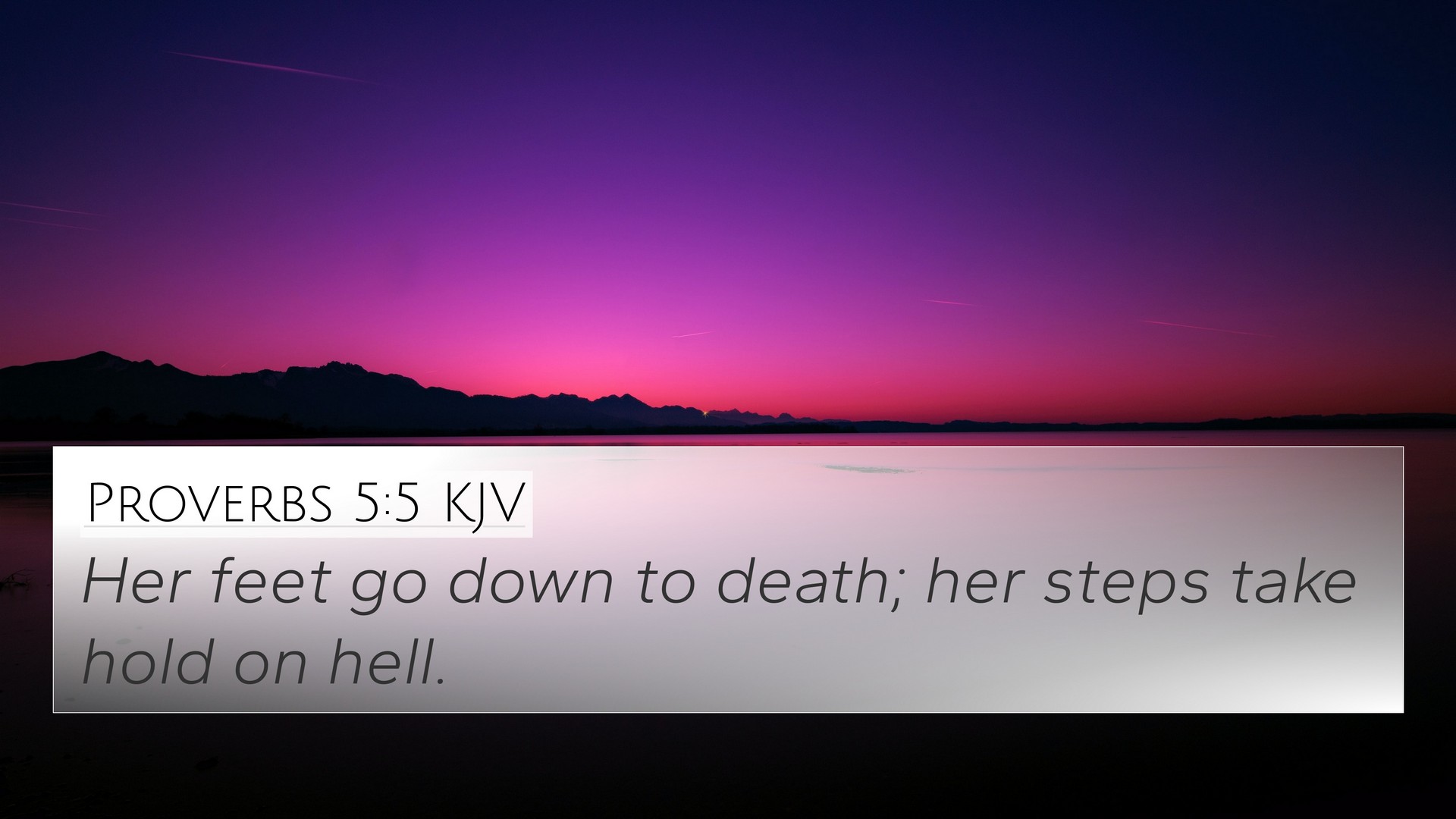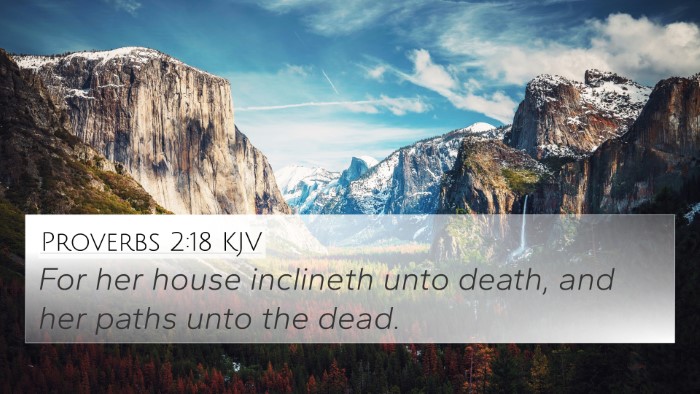Understanding Proverbs 5:5
Proverbs 5:5: "Her feet go down to death; her steps take hold on hell."
This verse is a stark warning regarding the consequences of immoral conduct, particularly in the context of sexual sin. The image presented is one of a path leading to destruction, emphasizing that the choices one makes can lead to dire and irreversible consequences.
Summary of Insights from Commentaries
The interpretations provided by various public domain commentaries illuminate the deeper meanings of this verse:
Matthew Henry
Henry emphasizes the seriousness of the temptation represented by the immoral woman. He suggests that her allure is not only seductive but ultimately leads down a path of death and spiritual despair. By focusing on the consequences of yielding to such temptations, Henry calls for wisdom and discretion in navigating moral choices.
Albert Barnes
Barnes points out that the mention of “death” signifies both physical and spiritual demise. He interprets the steps leading to hell as indicative of the inevitable fate of those who indulge in sinful pleasures. Barnes urges readers to recognize the peril this verse describes and to turn away from such temptations.
Adam Clarke
Clarke adds depth by analyzing the metaphor of "feet" and "steps." He interprets the woman as a personification of sin, whose path is deceptively enticing yet ultimately dominates the unguarded soul. He stresses the importance of self-awareness and the need to avoid such paths, reinforcing the moral lesson of the verse.
Cross-References for Proverbs 5:5
- Proverbs 2:18: "For her house inclines to death, and her paths to the dead."
- Proverbs 7:27: "Her house is the way to hell, going down to the chambers of death."
- James 1:14-15: "But each person is tempted when he is lured and enticed by his own desire. Then desire when it has conceived gives birth to sin..."
- Romans 6:23: "For the wages of sin is death, but the free gift of God is eternal life in Christ Jesus our Lord."
- Galatians 6:7-8: "Do not be deceived: God is not mocked, for whatever one sows, that will he also reap..."
- Ephesians 5:5: "For you may be sure of this, that everyone who is sexually immoral or impure, or who is covetous (that is, an idolater), has no inheritance in the kingdom of Christ and God."
- Matthew 7:13-14: "Enter by the narrow gate. For the gate is wide and the way is easy that leads to destruction, and those who enter by it are many."
- Proverbs 1:32: "For the simple are killed by their turning away, and the complacency of fools destroys them."
Thematic Connections and Analysis
This verse exemplifies various themes relevant throughout Scripture:
- Death and Sin: The connection between moral failure and its inevitable consequences is depicted throughout the Bible. This theme appears in both the Old and New Testaments, establishing a consistent warning against succumbing to temptations.
- Wisdom versus Foolishness: Proverbs regularly contrasts the wise and the foolish, showing the paths they choose. The wise follow God's commandments, while the foolish chase after fleeting pleasures.
- Spiritual Adultery: The idea of a 'forbidden woman' can be likened to Israel’s unfaithfulness to God, drawing parallels with prophetic literature.
- Consequences of Choices: The decisions made in life lead to outcomes, a prevalent theme that links Proverbs with the teachings of Jesus on sowing and reaping.
Practical Application and Reflection
In light of Proverbs 5:5, adherents to the faith are urged to reflect on their choices:
- Guarding Against Temptation: Understand where you tread and recognize situations that may lead to moral failure. Awareness is key in avoiding the pitfalls described in this verse.
- Embracing Wisdom: Seek wisdom diligently through prayer and studying the Scriptures. This aligns with the Proverbs as a guide for righteous living.
- Accountability: Foster relationships that support moral integrity and spiritual growth. Community can encourage steadfastness against temptations.
Conclusion
Proverbs 5:5 serves as a poignant reminder of the dangers associated with immoral choices. The insights from public domain commentaries provide a comprehensive understanding of its meaning, while the cross-references illustrate the connectedness of the Bible and the reinforced themes of life, death, and the consequences of sin. Engaging with these teachings through tools for Bible cross-referencing will enrich one’s study of the Scriptures and encourage deeper understanding.




